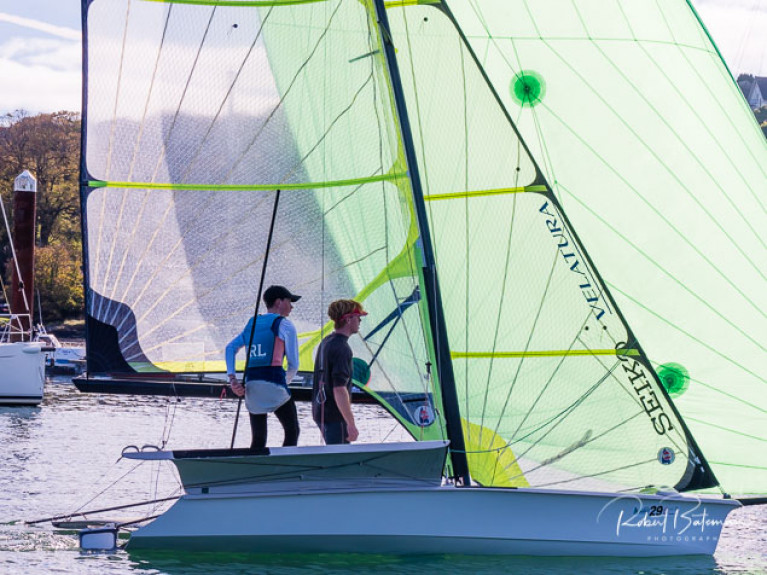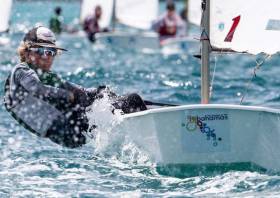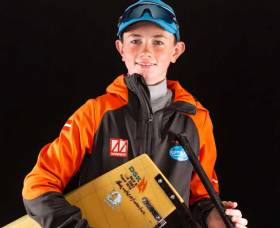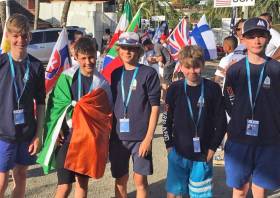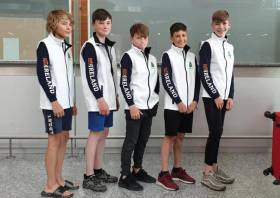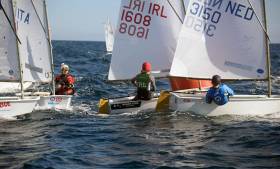Displaying items by tag: James Dwyer Matthews
Optimist Ace James Dwyer Matthews Takes a Tack in an Olympic 49er
Despite Royal Cork Yacht Club's Seafra Guilfoyle's super efforts at the sharp end of Ryan Seaton's 49er campaign for Tokyo 2021 next year, there's been little in the way of Olympic skiff sailing going on in Guilfoyle's home port for the past two seasons.
These fast and tricky skiffs are a handful for most and this has put them on a downward spiral in Cork Harbour.
So it was interesting to spot Optimist and Laser 4.7 ace James Dwyer Matthews of RCYC trying out a 49er (one of two in active use), with Chris Bateman of Monkstown Bay as his crew.
Guilfoyle, a 2014 world youth silver medalist, meanwhile, continues his campaign for selection in the 49er and is vying with a Dublin crew to win a single Irish berth against stiff competition for one of the final slots available for Japan.
Two In Top Five For Team Ireland At Optimist North Americans
Ireland had reason to celebrate at the Optimist North American Championship this past week with a podium finish among two top-five places.
Howth Yacht Club’s bright Oppy star Rocco Wright finished second just two points behind winner Gustavo Campos from Brazil — and James Dwyer Matthews of the Royal Cork/Kinsale wasn’t far behind in fifth place.
Ironically, the two were also separated by three spots in the final standings of this summer’s Optimist Worlds in Antigua.
In 83rd place, Clementine Van Steenberge (National Yacht Club) topped the girls who comprised the rest of Team Ireland in the Bahamas last week. Full results are available HERE.
In other youth sailing news, the National YC scored top results in the Junior Helmsman’s event in Schull last weekend.
Representing the Laser Radial, Clare Gorman with crew (and brother) Conor Gorman were second overall after taking the medal race, while Clare was also named first girl.
Rian Geraghty-McDonnell and crew Nathan Van Steenberge representing the 29er class were third overall.
James Dwyer Matthews is 'Sailor of the Month (Junior)' for August
When young James Dwyer Matthews of Royal Cork and Kinsale returned in early August from England with the 2019 British Optimist title added to his already impressive trophy list, it was in the knowledge that the up-coming Irish Nationals at Howth had attracted a fleet of 185 boats from 11 nations, with a notably strong American squad in the midst of it. Thus an almost unfair amount of expectation was resting on his 15-year-old shoulders in his final season as an Optimist sailor, and for much of the series, it was the extremely competent American helm Freddie Parkin who remained persistently if narrowly in the lead. But when the last day proved to be El Bruto with some very grown-up weather, Matthews was the man for it. Having taken a useful third in the penultimate race while Parkin was fourth, the chance was there, and Matthews took it, returning a convincing win while Parkin had to make it a discard with a tenth, leaving Matthews a clear winner with 15 points to Parkin’s 21, while 14-year-old Luke Turvey of the host club was third with 28, having taken second in that final bloodbath.
Howth’s Rocco Wright Makes Top 10 At Optimist Worlds
Howth Yacht Club’s Rocco Wright scored a tremendous result for Ireland as he placed 10th in the Optimist Worlds in Antigua earlier this week.
He was followed closely in the final standings by 13th-placed James Dwyer Matthews of the Royal Cork/Kinsale in the event won by the new three-time champion Marco Gradoni of Italy.
The rest of the Irish team are also to be commended for their finishes in a field comprising 255 young sailors: Sam Ledoux (National YC) was 70th overall, Luke Turkey (HYC) 100th and Ben O’Shaughnessy (RCYC) 159th.
In the glow of that achievement for the nation, the International Optimist Dinghy Association of Ireland (IODAI) has decamped to Waterford Harbour for the Optimist Munster Championships from today, Saturday 29 July.
The event is open to all boats of the IODAI across Regatta, Junior and Senior fleets, with the Notice of Race, Sailing Instructions and Supplementary Instructions available on the Waterford Harbour Sailing Club website.
The International Optimist Dinghy Association Ireland (IODAI) shared a photo yesterday (Sunday 30 June) of the five-strong team headed to Antigua to represent Ireland at the 2019 World Championships later this week.
Rocco Wright (Howth YC), James Dwyer Matthews (Royal Cork/Kinsale), Ben O’Shaughnessy (Royal Cork), Sam Ledoux (National YC) and Luke Turvey (Howth YC) will be supported by team coach Dara O’Shea at the event, where racing gets under way this Saturday 6 July.
They will be hoping to best the European team’s impressive performance in Brittany last week, placing 11th overall in a field of 300 sailors representing 50 countries.
Rocco Wright & James Dwyer Matthews Sail Strong For Ireland At International Palamós Optimist Trophy
It was a strong seventh-place finish overall for Howth Yacht Club’s Rocco Wright at the International Palamós Optimist Trophy, which concluded yesterday (Sunday 17 February) on Spain’s Costa Brava.
The youngster remained in medal contention among a 110-boat gold fleet all the way till the final day’s racing, following a phenomenal week where he was rarely out of the top three of his groups.
James Dwyer Matthews of the Royal Cork and Kinsale Yacht Clubs also had a strong showing bettering his performance in last month’s Torrevieja Trophy, placing 12th overall.
Jessica Riordan (Royal St George YC), Anna O’Connor (Royal Irish YC), Lucia Cullen (NYC/RStG), Rachel Flood (NYC), Trevor Bolger (RStG) and Peter Williams comprised the rest of the Irish contingent on the Costa Brava during the week.


























